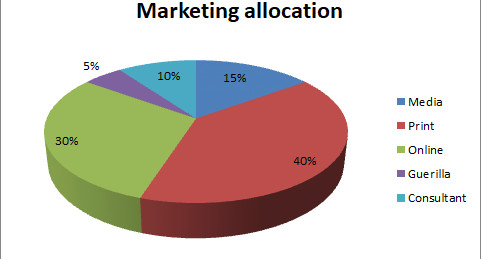In the realm of business, one question that frequently stirs the pot is, “What Percentage of Revenue Should Be Spent on Marketing?” For any entity, from startups to established conglomerates, grasping this figure is not just a matter of curiosity but a strategic imperative central to their growth and survival. As someone well-versed in the intricacies of marketing and financial planning, I recognize that there’s no one-size-fits-all answer, yet benchmarks and best practices exist to guide companies in their quest for the marketing Golden Ratio.
Direct Answer: On average, businesses are often advised to allocate between 6-20% of their total revenue to marketing efforts, with specific figures varying widely depending on industry, market conditions, and individual business goals.
Importance of a Marketing Budget
Having a dedicated marketing budget is not a luxury but a necessity that stands as the backbone of a successful business. A clearly defined budget acts as a compass directing your company’s marketing initiatives and ensuring that every dollar spent is an investment towards achieving your organizational goals. It lays the groundwork for strategic planning, helps set priorities, and ensures that resources are allocated towards the most promising opportunities and tactics that align with your company’s vision and objectives.
Determining the Ideal Marketing Budget
When it comes to nailing down the perfect spend on marketing, it’s crucial to start with a thorough assessment of your current marketing metrics and the outcomes of previous campaigns. Ask yourself: which strategies yielded the best results? Where did the company see the greatest return on investment? From here, it’s important to align your budget with the business’s overarching goals and growth targets. Are you aiming to break into a new market, maintain your current position, or perhaps capture a greater market share?
Industry specifics are also vital. As noted by HubSpot, businesses typically average between 6-20% of their revenue on marketing, though some stand by the 5% rule, a more conservative approach for those seeking a balance between growth and profitability. You can find further insights on this within their informative article on Marketing Budget allocation by Industry.

Source: LinkedIn
Factors Affecting Marketing Budget Allocation
Company’s Growth Stage
Budget allocation can be widely different when comparing startups to established enterprises, or even among those in rapid growth phases. A startup may need to splash more cash in marketing to carve out a niche and establish a foothold, whereas established businesses might be more focused on retention strategies and maximizing customer lifetime value.
Industry Norms and Competitors’ Expenditures
Keeping an eye on competitors is non-negotiable. The amount your rivals spend on marketing can serve as a valuable benchmark for your own budgeting. As per Web Strategies Inc., marketing budgets have experienced a dip to an average of 8.7% in recent times, showcasing a trend you might consider. Discover more about this in their article exploring How Much You Should Budget for Marketing in 2023.
Sales Revenue
It’s common practice to tie marketing budgets to a percentage of sales revenue, ensuring that the investment in marketing scales with the business. This also allows for adjustments based on the company’s profits and industry trends.
Available Resources and Prior Successes
A principle of savvy marketing investment is to draw on past achievements and available resources. Allocate more towards efforts that have shown success and be willing to pivot away from strategies that haven’t yielded the expected results.
Marketing Budget Breakdown By Industry
While specifics may vary, a detailed breakdown can illuminate what others in your field are committing to their marketing efforts. For instance, consumer packaged goods companies typically spend upwards of 20%, while energy companies may spend less than 5%. This variance underscores the critical importance of understanding your industry’s landscape when setting your marketing budget.
Expert Tips for Optimizing Marketing Budget
Customer Journey Understanding
Understanding the customer journey, from awareness to purchase, is imperative. It enables a business to target the right audience with the right message at the right time.
Investing in Agencies and In-House Teams
Weighing the benefits of external agencies against the merits of an in-house team is a pivotal decision. An agency might provide a breadth of experience but an in-house team offers dedicated focus.
Content Repurposing
Marketing is not always about creating new content. A treasure trove of value lies in repurposing and updating evergreen content to extend its lifespan and effectiveness.
Focusing on High-Performance Channels
Evaluate your channels meticulously. HubSpot aptly puts it: “For every dollar that goes in, you want five dollars coming out.” Optimizing spend for high-ROI channels is crucial. You can learn more by visiting their guide on optimizing marketing budgets.
Regular Strategy Reevaluation
Markets and consumer behaviors are ever-evolving. Regularly reevaluating strategies and adjusting them based on performance analytics is essential for maintaining a competitive edge.
Specific Budgeting Insights
Small Businesses
For small businesses, a stable market presence can often be attained by adhering to the 5% rule. An investment representing 5% of your revenue can maintain your current operations if done strategically and efficiently.
Mid-Size to Large Enterprises
For larger entities with market significance or aggressive growth plans, the investment might be heftier. These companies may need a tailored approach that reflects their unique position and targets.
Startups
New companies yearning for market penetration and swift growth might be looking at a considerably higher marketing budget. According to Direction, small businesses may need to allocate between 10 and 20% of their revenue to marketing. Find nuanced insights on this from their publication on Percentage of Revenue for Marketing Spend.
Tools and Resources for Marketing Budget Management
Marketing budget management necessitates accurate tools and processes. Software and analytics tools are invaluable for tracking spending, projecting results, and making informed adjustments on the fly.
In conclusion, the quest for the elusive perfect marketing budget is an ongoing strategic endeavor. The key is to craft a budget that not only supports but amplifies your business goals, always guided by performance data and industry benchmarks. Refine consistently, keep abreast of competitors, and above all, never stop testing new waters for the potential growth they might hold.

